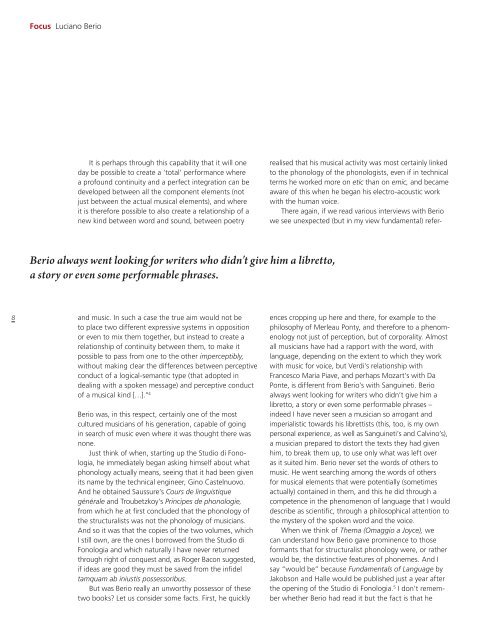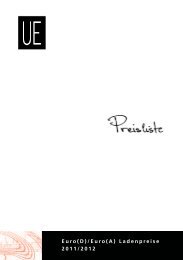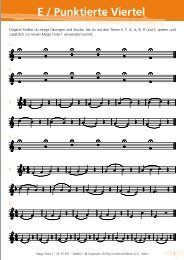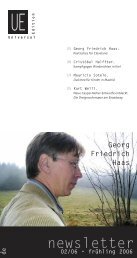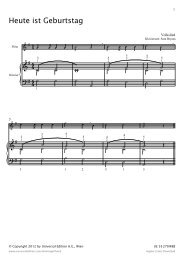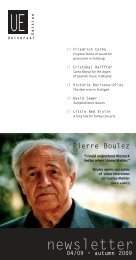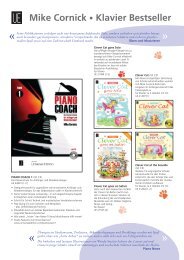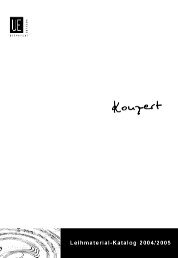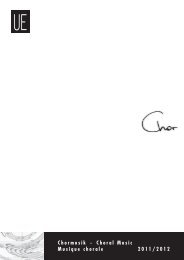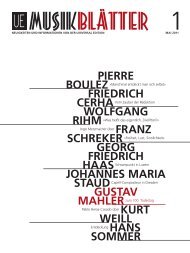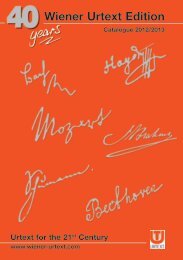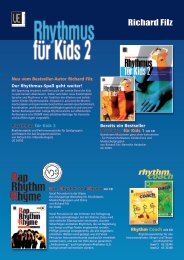Download a PDF file - Universal Edition
Download a PDF file - Universal Edition
Download a PDF file - Universal Edition
You also want an ePaper? Increase the reach of your titles
YUMPU automatically turns print PDFs into web optimized ePapers that Google loves.
8<br />
focus Luciano Berio<br />
It is perhaps through this capability that it will one<br />
day be possible to create a ‘total’ performance where<br />
a profound continuity and a perfect integration can be<br />
developed between all the component elements (not<br />
just between the actual musical elements), and where<br />
it is therefore possible to also create a relationship of a<br />
new kind between word and sound, between poetry<br />
Berio always went looking for writers who didn’t give him a libretto,<br />
a story or even some performable phrases.<br />
and music. In such a case the true aim would not be<br />
to place two different expressive systems in opposition<br />
or even to mix them together, but instead to create a<br />
relationship of continuity between them, to make it<br />
possible to pass from one to the other imperceptibly,<br />
without making clear the differences between perceptive<br />
conduct of a logical-semantic type (that adopted in<br />
dealing with a spoken message) and perceptive conduct<br />
of a musical kind […].” 4<br />
Berio was, in this respect, certainly one of the most<br />
cultured musicians of his generation, capable of going<br />
in search of music even where it was thought there was<br />
none.<br />
Just think of when, starting up the Studio di Fonologia,<br />
he immediately began asking himself about what<br />
phonology actually means, seeing that it had been given<br />
its name by the technical engineer, gino Castelnuovo.<br />
And he obtained Saussure’s Cours de linguistique<br />
générale and Troubetzkoy’s Principes de phonologie,<br />
from which he at first concluded that the phonology of<br />
the structuralists was not the phonology of musicians.<br />
And so it was that the copies of the two volumes, which<br />
I still own, are the ones I borrowed from the Studio di<br />
Fonologia and which naturally I have never returned<br />
through right of conquest and, as Roger Bacon suggested,<br />
if ideas are good they must be saved from the infidel<br />
tamquam ab iniustis possessoribus.<br />
But was Berio really an unworthy possessor of these<br />
two books? Let us consider some facts. First, he quickly<br />
realised that his musical activity was most certainly linked<br />
to the phonology of the phonologists, even if in technical<br />
terms he worked more on etic than on emic, and became<br />
aware of this when he began his electro-acoustic work<br />
with the human voice.<br />
There again, if we read various interviews with Berio<br />
we see unexpected (but in my view fundamental) refer-<br />
ences cropping up here and there, for example to the<br />
philosophy of Merleau Ponty, and therefore to a phenomenology<br />
not just of perception, but of corporality. Almost<br />
all musicians have had a rapport with the word, with<br />
language, depending on the extent to which they work<br />
with music for voice, but verdi’s relationship with<br />
Fran cesco Maria Piave, and perhaps Mozart’s with Da<br />
Ponte, is different from Berio’s with Sanguineti. Berio<br />
always went looking for writers who didn’t give him a<br />
libretto, a story or even some performable phrases –<br />
indeed I have never seen a musician so arrogant and<br />
imperialistic towards his librettists (this, too, is my own<br />
personal experience, as well as Sanguineti’s and Calvino’s),<br />
a musician prepared to distort the texts they had given<br />
him, to break them up, to use only what was left over<br />
as it suited him. Berio never set the words of others to<br />
music. He went searching among the words of others<br />
for musical elements that were potentially (sometimes<br />
actually) contained in them, and this he did through a<br />
competence in the phenomenon of language that I would<br />
describe as scientific, through a philosophical attention to<br />
the mystery of the spoken word and the voice.<br />
When we think of Thema (Omaggio a Joyce), we<br />
can understand how Berio gave prominence to those<br />
formants that for structuralist phonology were, or rather<br />
would be, the distinctive features of phonemes. And I<br />
say “would be” because Fundamentals of Language by<br />
Jakobson and Halle would be published just a year after<br />
the opening of the Studio di Fonologia. 5 I don’t remember<br />
whether Berio had read it but the fact is that he


